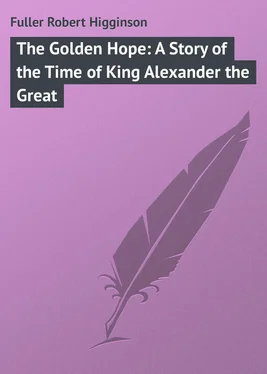Robert Fuller - The Golden Hope - A Story of the Time of King Alexander the Great
Здесь есть возможность читать онлайн «Robert Fuller - The Golden Hope - A Story of the Time of King Alexander the Great» — ознакомительный отрывок электронной книги совершенно бесплатно, а после прочтения отрывка купить полную версию. В некоторых случаях можно слушать аудио, скачать через торрент в формате fb2 и присутствует краткое содержание. Жанр: Прочие приключения, foreign_prose, на английском языке. Описание произведения, (предисловие) а так же отзывы посетителей доступны на портале библиотеки ЛибКат.
- Название:The Golden Hope: A Story of the Time of King Alexander the Great
- Автор:
- Жанр:
- Год:неизвестен
- ISBN:нет данных
- Рейтинг книги:4 / 5. Голосов: 1
-
Избранное:Добавить в избранное
- Отзывы:
-
Ваша оценка:
- 80
- 1
- 2
- 3
- 4
- 5
The Golden Hope: A Story of the Time of King Alexander the Great: краткое содержание, описание и аннотация
Предлагаем к чтению аннотацию, описание, краткое содержание или предисловие (зависит от того, что написал сам автор книги «The Golden Hope: A Story of the Time of King Alexander the Great»). Если вы не нашли необходимую информацию о книге — напишите в комментариях, мы постараемся отыскать её.
The Golden Hope: A Story of the Time of King Alexander the Great — читать онлайн ознакомительный отрывок
Ниже представлен текст книги, разбитый по страницам. Система сохранения места последней прочитанной страницы, позволяет с удобством читать онлайн бесплатно книгу «The Golden Hope: A Story of the Time of King Alexander the Great», без необходимости каждый раз заново искать на чём Вы остановились. Поставьте закладку, и сможете в любой момент перейти на страницу, на которой закончили чтение.
Интервал:
Закладка:
The plundering was not yet finished. Bands of soldiers were still searching for booty in the remoter quarters of the city, where their progress could be traced by the sound of their drunken laughter, mingled with the screams of their victims.
Macedonian guards paced the walls and cut off all hope of escape. The wretched inhabitants, driven into the highways, sought concealment in dark angles and narrow lanes, cowering in silence.
Here and there a woman, rendered desperate by her anguish, walked with dishevelled hair, heedless of insult, seeking her children among the slain in the hope that she might find them still alive.
Clearchus felt his heart grow faint at the thought that Artemisia might be exposed to the frightful chances of such a sack. Phœbus himself, he thought, might be unable to protect her, since here the temples of the Gods had been profaned. An old man in priestly robes stood out before them with trembling hands upraised.
"Vengeance, O Zeus!" he cried aloud. "Vengeance upon those who have violated the sanctuary of Dionysus, thy son! May they – " "Silence, Graybeard!" growled a soldier, striking him across the mouth with his fist.
The old man reeled from the blow and shrank away into the shadow.
"You'll choke if you ever try to drink wine again, Glaucis!" a comrade cried, laughing.
"Dionysus will forgive me soon enough for a sacrifice," Glaucis returned. "Never fear!"
Ptolemy learned that Alexander had gone to the Cadmea and thither he led Clearchus and Leonidas after he had dismissed his men, eager to take their share in the pillage. They found the young king in a large, bare room in the lower part of the citadel. He had not yet laid aside his armor, which was dented and scratched by use.
When they entered, he was giving orders to his captains, who stood grouped about him. Clearchus looked at him with eager interest. He saw a well-proportioned, athletic figure, no taller than his own. The handsome beardless face glowed with the warm blood of youth and a smile parted the full red lips. There was no trace of fatigue in the young king's attitude, despite the labors of the day, and his movements were alert and decisive. He looked even more youthful than his twenty-one years as he stood among his leaders, some of whom were veterans of Philip's campaigns, grizzled with service. But in spite of his youth, there was a confidence in his bearing that left no doubt of who was master.
Clearchus felt himself strangely drawn to the young man whom all Hellas, with the exception of Sparta, acknowledged as its champion, and who was about to assail that great power beyond the Hellespont, whose limits were unknown and before whom Greece had stood in dread since the days of Great Cyrus. The Athenian found the "boy king" very different from the arrogant, mean-spirited upstart that the orators of his city had painted him.
"Stop the plundering," Alexander said to his captains. "Even the Bœotians must be satisfied by this time. Let the men go back to the camp, and see that order is maintained. The Ætolians and the Elæans are on the march and reënforcements are coming from Athens. There may be more work to do to-morrow."
As the officers left him to execute his commands, Alexander turned to Ptolemy with hands outstretched.
"I am glad to see you safe!" he said. "You charged bravely before the gate, and I feared that something might have happened that would deprive me of your aid when we march into Persia."
Ptolemy's bronzed face reddened with pleasure as he heard the praise of the young king.
"I went in pursuit of the enemy's cavalry," he said.
"Is it likely that any of those who escaped will be able to rally?" Alexander asked.
"They are scattered in every direction and think only of flight," Ptolemy replied.
"That is well," Alexander said. "We shall be the better able to deal with the others when they come. Who are these that you have brought to me?"
He turned toward the two young men, who had been standing at a little distance, and looked them frankly in the eyes.
"This is Clearchus, an Athenian, and this, Leonidas of Sparta," Ptolemy replied, presenting them in turn.
Alexander's face clouded at the names of the two most powerful of the states that opposed him in Greece, and Ptolemy hastened to add: "They saved my life when my horse stumbled in the pursuit, and they have a request to make of you."
"You have done me a great service," Alexander said kindly. "What is it that you desire?"
"We ask clemency for the family of Jason, on behalf of Chares, his son, whom we left behind in Athens," Clearchus replied.
"And why is he not in Thebes?" Alexander asked quickly.
"Because he did not know that you were coming," Clearchus said. "Had he been aware of the danger, he would not have been absent. We heard of your arrival while we were in Delphi, and we made all haste to remind you that Jason was a guest-friend of your father, Philip."
"Orders have been given that the guest-friends of Macedon shall be spared, both in their lives and their property," Alexander replied. "What did you in Delphi?"
Clearchus told him briefly how Artemisia had been stolen and of the response of the oracle.
"Love must be a strong passion," the young king said thoughtfully.
"I would give all that I possess to recover Artemisia," Clearchus replied. "Nor would I be willing to exchange my hope of finding her for the wisdom of Aristotle or even for the hopes of Alexander."
"So you know Aristotle," Alexander said. "He is a wonderful man. Were I not Alexander, I would envy him." He looked curiously at Clearchus as he spoke, as though he were considering something that he did not understand. "So that is what they call love," he continued, "and I and my army are the Whirlwind of which the God spoke." He beckoned to an attendant. "Call Aristander!" he said.
He made Clearchus repeat his story to the famous soothsayer. Aristander listened attentively, stroking his chin with the tips of his fingers as his custom was.
"What do you think of it?" Alexander asked, when Clearchus had finished. Everybody knew the confidence that he placed in the words of the prophet and that he never took an important step against his advice.
"Full credit must be given to the oracle," Aristander said, turning his blue eyes upon the young king, "and I think that the priests of the temple were right in their interpretation, since the message brought and the title given could have had no other meaning. As the maid was carried away by sea, she was probably taken to some island or to one of the cities on the coast of Asia. The Whirlwind's track must needs lead thither, and since the maid is to be set free, it is clear that the Whirlwind shall prevail."
"Then the oracle is propitious!" Alexander exclaimed. "What is your plan?" he added to Clearchus.
"I shall obey the oracle and follow in thy track," the Athenian replied. "If thou wilt permit me, I myself will become a part of the Whirlwind."
Alexander looked at him with the unquenchable fire of enthusiasm in his eyes.
"Thou art welcome!" he said. "And you, my friend of stubborn Sparta?" he continued to Leonidas.
"I go with Clearchus," the Spartan responded briefly.
"You shall be of my Companions," Alexander cried, placing his hand upon a shoulder of each. "The world grows old and we have been wasting our strength in foolish quarrels with each other while the tiger has been lying there across the water, waiting to devour us. We shall show him that the spirit of Hellas still lives, although Troy has fallen, and we will do deeds that shall be sung by some new Homer as worthy too of a place beside those of Achilles and Ajax and Agamemnon. Yes, and we will bring back a fleece more precious than that which the Argonauts sought. I promise you that the Whirlwind's track shall be long enough and broad enough to lead you to your heart's desire, whatever it may be. Ptolemy, I count these men among my friends and I give them into your charge."
Читать дальшеИнтервал:
Закладка:
Похожие книги на «The Golden Hope: A Story of the Time of King Alexander the Great»
Представляем Вашему вниманию похожие книги на «The Golden Hope: A Story of the Time of King Alexander the Great» списком для выбора. Мы отобрали схожую по названию и смыслу литературу в надежде предоставить читателям больше вариантов отыскать новые, интересные, ещё непрочитанные произведения.
Обсуждение, отзывы о книге «The Golden Hope: A Story of the Time of King Alexander the Great» и просто собственные мнения читателей. Оставьте ваши комментарии, напишите, что Вы думаете о произведении, его смысле или главных героях. Укажите что конкретно понравилось, а что нет, и почему Вы так считаете.












